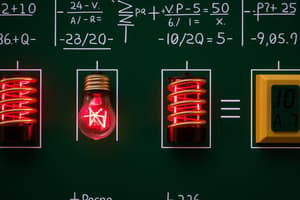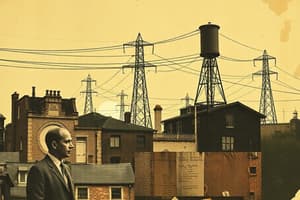Podcast
Questions and Answers
What is the equation for electrical energy in terms of power and time?
What is the equation for electrical energy in terms of power and time?
- E = P + t
- E = V + I
- E = VIt
- E = Pt (correct)
What happens to electrical energy as it passes through a conductor with high resistance?
What happens to electrical energy as it passes through a conductor with high resistance?
- It is stored in chemical form.
- It is completely converted into kinetic energy.
- It is mostly converted to heat energy. (correct)
- It decreases in value.
What is the principle mechanism of heat transfer in an electric kettle?
What is the principle mechanism of heat transfer in an electric kettle?
- Radiation
- Conduction and convection
- Conduction only
- Convection (correct)
If an electric kettle operates at 240 V and uses a current of 40 A for 20 minutes, how is electrical energy calculated?
If an electric kettle operates at 240 V and uses a current of 40 A for 20 minutes, how is electrical energy calculated?
How much does it cost to use 1000 W of power for one hour if electricity costs 20 cents per kWh?
How much does it cost to use 1000 W of power for one hour if electricity costs 20 cents per kWh?
In what way do electric ovens and heaters utilize the concept of electrical energy?
In what way do electric ovens and heaters utilize the concept of electrical energy?
Why is the heating element of an electric kettle placed at the bottom?
Why is the heating element of an electric kettle placed at the bottom?
What does the symbol 'P' represent in the equation E = Pt?
What does the symbol 'P' represent in the equation E = Pt?
What is the primary reason nichrome wire is used in heating elements?
What is the primary reason nichrome wire is used in heating elements?
How is electrical power defined in a circuit?
How is electrical power defined in a circuit?
What is the danger of operating electrical appliances in damp conditions?
What is the danger of operating electrical appliances in damp conditions?
What causes a short circuit when using electrical appliances?
What causes a short circuit when using electrical appliances?
What should be done if the insulation casing on a wire is damaged?
What should be done if the insulation casing on a wire is damaged?
Why is touching a power point with a wet hand dangerous?
Why is touching a power point with a wet hand dangerous?
What is the function of a fuse in an electrical circuit?
What is the function of a fuse in an electrical circuit?
What can occur if a short circuit happens in an electrical appliance?
What can occur if a short circuit happens in an electrical appliance?
What is the primary function of a fuse in an electrical circuit?
What is the primary function of a fuse in an electrical circuit?
What happens to a fuse when the current exceeds its rating?
What happens to a fuse when the current exceeds its rating?
What should be immediately reported when it is discovered?
What should be immediately reported when it is discovered?
What is the recommended action to prevent overheating of electrical cables?
What is the recommended action to prevent overheating of electrical cables?
Which of the following is true regarding fuse ratings?
Which of the following is true regarding fuse ratings?
What could be a severe consequence of using a fuse with a rating too high for an appliance?
What could be a severe consequence of using a fuse with a rating too high for an appliance?
Why is it dangerous to have bare or exposed live wires?
Why is it dangerous to have bare or exposed live wires?
What is the primary function of a circuit breaker?
What is the primary function of a circuit breaker?
Which statement accurately describes the Miniature Circuit Breaker (MCB)?
Which statement accurately describes the Miniature Circuit Breaker (MCB)?
How does the Residual Current Circuit Breaker (RCCB) function?
How does the Residual Current Circuit Breaker (RCCB) function?
Why is earthing important in electrical systems?
Why is earthing important in electrical systems?
What occurs when a live wire touches a metal case with a loose connection?
What occurs when a live wire touches a metal case with a loose connection?
What is a characteristic of circuit breakers in comparison to fuses?
What is a characteristic of circuit breakers in comparison to fuses?
How are circuit breakers classified?
How are circuit breakers classified?
What must be considered to determine when a circuit breaker trips?
What must be considered to determine when a circuit breaker trips?
What is one safety concern regarding the replacement of a blown fuse?
What is one safety concern regarding the replacement of a blown fuse?
What is a primary advantage of using fuses over circuit breakers?
What is a primary advantage of using fuses over circuit breakers?
Why are double insulated appliances less risky for users?
Why are double insulated appliances less risky for users?
What must be done to circuit breakers that have interrupted a severe fault?
What must be done to circuit breakers that have interrupted a severe fault?
Why should appliances not be operated in wet areas?
Why should appliances not be operated in wet areas?
How often should circuit breakers be maintained for optimal operation?
How often should circuit breakers be maintained for optimal operation?
What is a serious risk associated with using wet hands when operating electrical devices?
What is a serious risk associated with using wet hands when operating electrical devices?
What happens when a double insulated appliance is wet?
What happens when a double insulated appliance is wet?
Flashcards are hidden until you start studying
Study Notes
Electrical Energy and Power Calculation
- Electrical energy (E) is defined as E = Pt, where P is power and t is time.
- Power (P) can also be expressed as P = VI, leading to E = VIt.
- Electrical energy is often measured in kilowatt-hours (kWh), with costs specified accordingly (e.g., 20 cents per kWh).
Heating Effect in Appliances
- Conductors heat up when electric current passes through them.
- Higher resistance in conductors results in more conversion of electrical energy to heat, utilized in devices like kettles, ovens, and heaters.
- Electric kettles have heating elements at the bottom to maximize heat transfer through convection.
Safety Risks with Electricity
- Operating electrical devices in damp conditions is hazardous, as wet skin lowers resistance and can cause electric shocks.
- Damaged insulation around wires poses serious dangers, including short circuits and possible electrocution.
Safe Use Measures
- Fuses are designed to melt and break the circuit if the current exceeds safe levels, preventing fire hazards.
- Common fuse ratings are 3 A, 5 A, and 13 A, with selection based on appliance requirements.
- Circuit breakers automatically cut off current in cases of overload or short circuit and are resettable.
Types of Circuit Protection
- Miniature Circuit Breakers (MCBs) protect specific circuits by disconnecting during excessive current flow.
- Residual Current Circuit Breakers (RCCBs) monitor current leakage and interrupt the supply when an earth fault occurs.
Electrical Insulation and Safety Mechanisms
- Double insulation protects users by encasing live wires within reinforced insulating materials, preventing exposure during electric leakage.
- Earthing safely disperses static charges from appliances, preventing shocked contact with metal casings.
Maintenance and Inspection
- Circuit breakers should be tested annually by switching them off and on to ensure functionality.
- Damaged fuses and malfunctioning circuit breakers must be reported or replaced promptly to maintain safety.
Operational Precautions
- Do not handle electrical appliances with wet hands to minimize the risk of electric shock.
- Avoid using appliances that lack earthing systems in wet areas, increasing safety against electrocution.
Studying That Suits You
Use AI to generate personalized quizzes and flashcards to suit your learning preferences.




